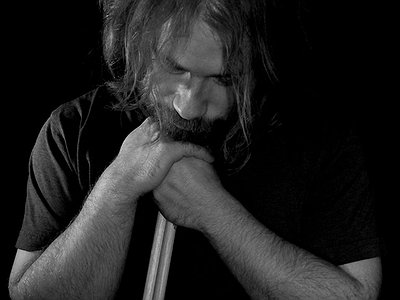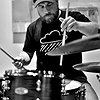Part 1
Name: Jeff Cosgrove
Occupation: Drummer
Nationality: American
Current Release: History Gets Ahead of the Story on Grizzley Music with Jeff Lederer and John Medeski
Recommendations: I recently watched the movie On the Basis of Sex about Ruth Bader Ginsberg.It reminded me that life is a series of obstacles and challenges and that you shouldn’t accept no based on things having always been a specific way.Look to yourself and open yourself to the opportunity to make something meaningful to you when faced with a challenge that seems insurmountable.
If you enjoyed this interview with Jeff Cosgrove, visit his website for everything you ever wanted to know about him. Also check out our 15 Questions Interview with Jeff Lederer.
When did you start playing your instrument, and what or who were your early passions or influences? What is about music and/or sound that drew you to it?
I started playing the drums at 12 and my biggest early influences at that time were Mitch Mitchell and Ginger Baker. There is a reckless abandon and passion to both of their playing that drew me in. Cream and the Jimi Hendrix Experience were bands that I was obsessed with and there is a looseness/width to their music that I connected with on a very subconscious level. It felt like things could fall apart at any moment but in that last moment of chaos those musicians were able to bring it all together. It was the feeling that out of disfunction and chaos could come something that sparked a sense of joy and belonging that I had never felt before.
For most artists, originality is first preceded by a phase of learning and, often, emulating others. What was this like for you? How would you describe your own development as an artist and the transition towards your own voice? What is the relationship between copying, learning and your own creativity?
Growing into my musicianship, I bastardized a lot of my favourite drummers (and still do) – Elvin Jones, Paul Motian, Ben Riley, Joe Chambers, Art Blakey, Mitch, Ginger, Andrew Cyrille … the list could go on forever. I could never make their ideas come through me or sound natural in any way.
I had two teachers, Mike Shepherd and Tony Martucci – who are also huge influences on me, that encouraged me to sound like me. They helped me hear the tone of my ride cymbal, the shape, and the length of the sound I was trying to produce. There will always be the stamps of those who influenced me that I always hear in my playing, even if others don’t. I’m an gumbo of my influences, so to speak. For better or worse, I just kind of sound like me now. The musicians who have been open to my sound as it evolves have given me the confidence to stay on that path.
What were some of your main artistic challenges when starting out as an artist and in which way have they changed over the years?
Self-confidence and connecting with musicians looking to make music in a similar path have been challenges at the forefront of my musical development.
I very much have struggled with confidence and a somewhat imposter syndrome – that I shouldn’t be playing with the musicians I get to share the stage with, but that is some weird negative self-talk which I’ve worked really hard to quiet over the years. Additionally, I live in a rural area and there are simply less musicians looking to collaborate and create the music I want to make. The solution to that was simply to be open to larger possibilities and ask the musicians I was inspired by to make some music together.
This is where my stubbornness and determination is the asset to breaking down internal barriers.
Tell me about your instrument, please. How would you describe the relationship with it? What are its most important qualities and how do they influence the musical results – and possibly even your own performance?
Drums and cymbals are just that, something that I get to bang on. That being said, I have a set of 1970s Slingerland drums that were given to me by my former teacher Mike Shepherd, which had been owned by another teacher of mine, Tony Martucci before Mike. These are by far the most personal and inviting drums I have ever played. There is something about Mike and Tony’s spirit that has been imbued into the instrument. When I play them, I feel at home. There is a richness and captivating energy about them.
Cymbals are a pretty personal part of the instrument for me and I’ve moved through some different sets over the years. It’s weird because I have a hard time judging the pitches of cymbals and if they go together well, I rely on how the stick feels hitting it and the vibration it sends back through the stick into my arm. The response of the energy leaving me and coming back to me through the cymbal that helps me know if a cymbal is for me. If the cymbals I decide to use are thicker, they respond slower but resonate longer, and I will play differently, letting the cymbals speak through their voices.
I work hard to hear the end of each note I play on the drums/cymbals, it is the breath of the music to me.
Derek Bailey defined improvising as the search for material which is endlessly transformable. Regardless of whether or not you agree with his perspective, what kind of materials have turned to be particularly transformable and stimulating for you?
I find conversation with people to be a bottomless well of material and inspiration for improvisation. There is a deep art of listening and understanding that exists in improvisation and in conversation that I think in our hyper-connected, overly stimulated world is starting to get lost. Just talking to someone about how their day was and listening to what they emphasise inspires me, whether they’ve had a good day or a bad day, they’re excited or sad or blah or very matter of fact. There is so much energy that people exude while their engaged in conversation and I love it!
Additionally, I hear rhythm everywhere. Leaves falling, my kids shuffling about in my house, people mowing their lawns, cars driving by, it’s all rhythmic and that is incredibly inspirational and transformable.
How is playing live in front of an audience and in the studio connected? What do you achieve and draw from each experience personally? How do you see the relationship between improvisation and composition in this regard?
Playing live and in the studio are connected for me by the music and the people I get to make music with. For me, the live performance invites the audience where they help shape and change the direction of the music as the musicians are creating it.
In the studio, it puts more on the musicians to create the emotional response which can be difficult at times. Both live and the studio I’m offered the opportunity to lose myself in music that I love. It fills me with joy to be able make music and I’m grateful if someone gets something out of the music I put into the universe.
I see improvisation as an extension of composition – even if the composition is spontaneously composed. There needs to be a foundation and a commitment to both improvisation and composition to stir emotional responses from the musicians and the listener(s).
Could you take us through a day in your life, from a possible morning routine through to your work? Do you have a fixed schedule? How do music and other aspects of your life feed back into each other - do you separate them or instead try to make them blend seamlessly?
My day starts with getting my kids moving in the morning for school. None of us are morning people and it can be a struggle to get everyone set up for the things they need to do in the day.
With my drumset practice, I break it up into chunks of 5,5-10 mins per exercise, that way I can drop into it whenever I have a moment. I do a similar thing with practicing my compositional stuff as well. I break that up into 3 10min chunks. Sometimes I'm lucky enough to sit and just practice but that is pretty rare these days between running my kids to their activities, day job, and stuff that needs to get done to keep the household moving. Even if I’m not able to get to my drumset or practice my compositions, I am always thinking about music or listening to it. My kids think I’m crazy as I walk around the house singing rhythms to myself as I put laundry away or there is always a record going.
Physical exercise is a big part of my routine as well and has been for a long time. I can be a pretty high energy person and it really helps me burn off some of that excess and focus myself. Pre-quarantine, I was at the gym 3 days a week and I run about 4-6 miles 4 days a week. Now, I’m just running and working out 4 days with my younger son. We have a good time.
I try to not separate music from the other aspects of my life, they’re all connected through me. The improvisational nature helps a lot in my daily life and work because it reminds me to be flexible, be in the moment, and listen.






